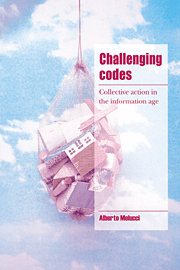Book contents
- Frontmatter
- Contents
- Preface and acknowledgements
- Introduction
- Part I Theory of collective action
- 1 The construction of collective action
- 2 Conflict and change
- 3 Action and meaning
- 4 The process of collective identity
- Part II Contemporary collective action
- Part III The field of collective action
- Part IV Acting collectively
- References
- Index
4 - The process of collective identity
Published online by Cambridge University Press: 23 November 2009
- Frontmatter
- Contents
- Preface and acknowledgements
- Introduction
- Part I Theory of collective action
- 1 The construction of collective action
- 2 Conflict and change
- 3 Action and meaning
- 4 The process of collective identity
- Part II Contemporary collective action
- Part III The field of collective action
- Part IV Acting collectively
- References
- Index
Summary
Defining collective identity
The concept of collective identity was introduced in my previous contributions to the analysis of contemporary social movements (Melucci 1988, 1989, 1994), and has already stimulated a promising discussion (Bartholomew and Mayer 1992; Gamson 1992a; Mueller 1994; Proietto 1995). In recent sociological debates we are witnessing a renewed interest in cultural analysis which corresponds to a shift towards new questions about how people make sense of their world, how they relate to texts, practices, and artifacts rendering these cultural products meaningful to them (see Swidler 1986, 1995; Wuthnow et al. 1984; Wuthnow 1987; Wuthnow and Witten 1988; Clifford 1988; Alexander 1990; Alexander and Seidman 1990). The contributions of social psychology in terms of scripts (Schank and Abelson 1977; Abelson 1981), social representations (Farr and Moscovici 1984; Moscovici 1988), the rhetorical construction of arguments and thoughts (Billig 1991, 1992, 1995), as well as the reflections on the discoursive construction of identity (Gergen 1982, 1985, 1989, 1991; Shotter and Gergen 1989; Shotter 1993b; Harré and Gillett 1994) are also part of this shift towards a better understanding of the human capacity to construct meaning and to make sense of action.
The present interest in culture and meaning is paralleled by a growing discussion on the topic of identity, both at the individual and collective level, which crosses different disciplinary fields in social sciences (for an introduction see Hirsch 1982; Weigert et al. 1986 Berkowitz 1988; Abrams and Hogg 1990; Burkitt 1991; Breakwell 1992; Barglow 1994).
- Type
- Chapter
- Information
- Challenging CodesCollective Action in the Information Age, pp. 68 - 86Publisher: Cambridge University PressPrint publication year: 1996
- 6
- Cited by

